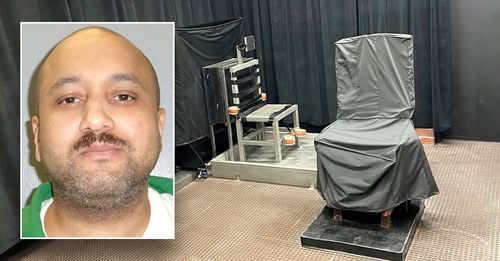Mikal Mahdi Executed by Firing Squad in South Carolina: Historic Execution Marks the Fifth in the State Since 2024 Resumption of Capital Punishment and the Second Use of Firing Squad as a Method
Columbia, SC — April 11, 2025 — Mikal Deen Mahdi, 42, was executed by firing squad at the Broad River Correctional Institution on April 11, 2025, marking a significant and controversial moment in the history of South Carolina’s capital punishment system. Mahdi’s execution is the latest in the state’s renewed use of the death penalty, following a 13-year moratorium on executions that was lifted in 2024.
Mahdi’s execution makes him the fifth person to be executed in South Carolina since the state resumed capital punishment. He is also the second individual in the state and the fifth in the United States since 1976 to face execution by firing squad, a method that has ignited both debate and outrage across the nation.
The execution took place at the Broad River Correctional Institution, a high-security facility in Columbia, where Mahdi had been held since his conviction. The decision to execute Mahdi by firing squad followed his choice from a list of execution methods available to inmates in South Carolina, including lethal injection, the electric chair, and firing squad. Mahdi had expressed his preference for the firing squad, which was reinstated as a method of execution in South Carolina following difficulties with obtaining lethal injection drugs.
The Crime and Conviction: Mikal Mahdi was convicted in 2006 for the brutal killing of Mariah Jenkins, a 31-year-old mother of two, during a robbery gone wrong. Mahdi, who had a lengthy criminal history, was involved in a violent altercation that escalated to murder. He was arrested shortly after the crime and sentenced to death after a jury found him guilty of first-degree murder, armed robbery, and kidnapping.
Throughout his time on death row, Mahdi maintained his innocence, claiming that he had been coerced into his confession. Despite multiple appeals, including attempts to have his sentence commuted or reduced, the courts upheld the death penalty. His legal team had argued that Mahdi had faced inadequate defense during his trial and that new evidence might exonerate him, but these claims were dismissed.
The Firing Squad Execution: At approximately 6:00 a.m. on the morning of April 11, Mahdi was led to the execution chamber at Broad River Correctional Institution. Dressed in a white prison uniform, Mahdi was secured to a chair in front of a small group of witnesses, including family members of the victim and prison officials. His final statement was brief; Mahdi expressed remorse for his actions, telling those present, “I’m sorry for the pain I’ve caused.”
The execution proceeded in accordance with state law. Five prison officers, each with a rifle, stood at a distance and fired simultaneously at Mahdi, who was covered with a white cloth. A doctor declared Mahdi dead moments after the shots were fired. The procedure, which lasted only a few seconds, was over quickly, but the implications of using such a method of execution have sparked widespread debate.
Controversy Surrounding the Firing Squad: The firing squad has been one of the most controversial methods of execution in modern times. Critics argue that it is an outdated and inhumane practice, with the potential to cause unnecessary suffering. While proponents argue that it is a more reliable and less painful alternative to lethal injection, especially given the challenges in obtaining the drugs required for lethal injections, the method remains a focal point of public criticism.
South Carolina became one of the few states to reinstate the firing squad as an option for executions following difficulties securing the chemicals necessary for lethal injections. The state passed legislation in 2021 that made firing squad execution the default method of capital punishment in cases where the condemned inmate did not choose lethal injection or the electric chair. Mahdi’s choice to undergo execution by firing squad made him the second person in the state to meet such an end.
In the weeks leading up to the execution, protests erupted outside Broad River Correctional Institution and throughout the state. Anti-death penalty activists called for the abolition of capital punishment, citing the irreversible nature of the penalty and concerns over racial disparities and the potential for wrongful convictions. They also raised concerns about the firing squad method, which, despite being less commonly used in the modern era, remains a deeply divisive topic.
Public and Legal Reactions: The execution has drawn reactions from both supporters and critics of the death penalty. Governor Henry McMaster, a staunch supporter of capital punishment, issued a statement following Mahdi’s execution, calling it “justice for the victim and a reflection of South Carolina’s commitment to upholding the rule of law.” He added that the execution “shows that South Carolina will not tolerate violent crime and will ensure that those who commit heinous acts are held accountable.”
On the other hand, Amnesty International condemned the execution, arguing that it violates fundamental human rights and is a form of “cruel, inhuman, and degrading treatment.” The organization also raised concerns about the broader impact of South Carolina’s renewed use of the death penalty, pointing to the potential for future miscarriages of justice.
South Carolina’s Capital Punishment History: South Carolina had a 13-year moratorium on executions that began in 2008, during which no executions took place due to legal challenges and difficulties acquiring the necessary drugs for lethal injection. Mahdi’s execution is part of a broader trend of states revisiting the death penalty after years of legal battles over its constitutionality and efficacy.
Since the state resumed executions in 2024, five individuals have been executed, and all have been given the option to choose their method of execution. The return of the firing squad and electric chair as alternatives to lethal injection has reignited debates about the ethics of the death penalty and the state’s role in administering capital punishment.
As of now, South Carolina has one other inmate scheduled for execution in the coming months, though the method of execution remains to be determined.
Looking Ahead: Mikal Mahdi’s execution serves as a grim reminder of the continued use of the death penalty in South Carolina and across parts of the United States. While the debate over capital punishment rages on, the impact of Mahdi’s execution—especially by firing squad—will likely resonate for years to come.
For more information or support related to death penalty advocacy and its legal implications, please contact the American Civil Liberties Union (ACLU) or Amnesty International.

